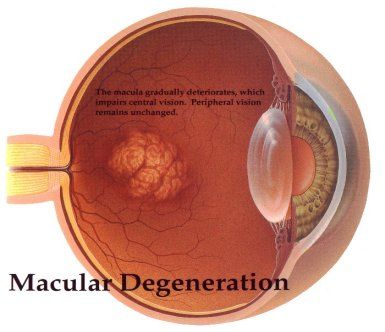
Remember when you were growing up and your grandma would say “you must eat your carrots or you won’t be able to see in the dark?” Well, there research has now proved that eating certain foods can improve your eyesight, reverse the signs of optical ageing and keep your eyes in good health.
One of the most common causes of eyesight degeneration is a condition called macular degeneration, which affects around for 50 per cent of the people who report sight problems. If you think of your eyes as cameras, you’ll know there is a lens and an opening at the front which helps to focus what you see on to the retina at the back of your eye. The macula lies in the centre of the retina, which is sensitive to light. Sometimes the macula suffers impairment to the cells and if it becomes damaged, you may lose the ability to distinguish between colours and can struggle to read. Although the condition rarely causes total blindness, it can lead to photosensitivity (a sensitivity to light) or obstructions in your line of vision.

There are some remedial steps you can take to protect your eyes from damage in the future, and as with all diseases, eating the right foods will be the number one way to ensure you preserve your eyes, naturally. Follow these guidelines to eating your way to better eyesight.
- Kale
Researchers at the Florida International University found that eyes containing higher amounts of a nutrient called lutein were up to 80% less likely to have degeneration issues. The way lutein protects the eye is by forming pigments in the macula. The foods most rich in lutein are cruciferous, or green leafy vegetables. Kale contains the highest amounts of lutein than any other vegetable. A study in the American Journal of Clinical Nutrition found that eating a teaspoon of green leafy veggies with a small amount of fat raised blood lutein levels by nearly 90 per cent. - Carrots
Looks like your mother was right: eating carrots can actually help you see in the dark. Basically, carotene: an essential nutrient which the liver converts into vitamin A. Vitamin A protects the eyes by helping to absorb the light energy that passes into the eye. Increasing your intake of vitamin A will allow your eyes to absorb more energy and become more sensitive in dim light; helping you see more effectively. - Mangoes
Aside from carrots, mangoes are another excellent excellent source of Vitamin-A and flavonoids like beta-carotene, alpha-carotene, and beta-cryptoxanthin. When combined; these compounds have been known to have antioxidant properties, keeping your immune system healthy and they are essential for maintaining healthy vision. Vitamin A is also promotes healthy mucus membranes and skin, meaning eating mangoes help to look after all cells and ensure they stay coagulated. - Blueberries
What Bugs Bunny didn’t let on is that there is another food famed for its ability to boost night vision. It’s a secret uncovered by pilots in WWII, who felt their night vision improved after eating blueberries. The secret ingredient in blueberries is a group of compounds called anthocyanosides. These nutrients attach to the area of the retina that is responsible for adjusting the eyes to see in the dark, giving you tip top vision as winter steals light! - Black currant
Black currants boast some of the highest levels of the antioxidant anthocyanins. They’re also rich in essential fatty acids and have additional anti-inflammatory properties to alleviate the painful conditions tired eyes can be under. Fresh, seasonal organic ones are best. - Orange Pepper
Orange peppers have the highest amount of zeaxanthin in any food group. What this means is that eyes are being strengthened by the way of these caratenoid alcohols acting to modulate light energy. In addition, they act as non-photochemical quenching agents to deal with chlorophyll production in plants; meaning they kind of control the light filtering to plants and to us! - Paprika
As well as being a delicious tasting additive to include in our meals, paprika is another great source of zeaxanthin: boosting the eye’s response to light. As macular degeneration kicks in, eyes become more sensitive to light and eating paprika rich foods helps to prevent this. Evidence also suggests that paprika protects eye tissues and other cells, plus it also contains carotenoids. - Eggs
One raw egg yolk contains about 0.25 mg each of lutein and zeaxanthin, which means they are good for sight in general. What makes eggs so much more efficient in boosting eyesight that they are highly absorbable by the body. Lutein is an oil-soluble nutrient, and eating eggs can assist with absorbing it within the system. - Coconut
For proper absorption of the relevant nutrients for your body, such as lutein, zeaxanthin and caratenoids, you need to add a little bit of healthy fat into your diet. Coconut oil, milk or water contain excellent levels of potassium, which helps to keep your vision sharp. - Salmon
With a quotient of two potent eye nutrients: omega-3 fats, and astaxanthin, salmon is particularly beneficial for your eyes. It’s also low in mercury, which can have a damaging effect on eyesight. Omega-3 fat DHA found in salmon provides structural support to cell membranes; boosting eye health and protecting your retinal function. Astaxanthin protects against a number of eye diseases, including blindness. - Crustaceans
Crab, shrimp and lobster are other types of seafood, which contain astaxanthin, which is an exceptionally potent antioxidant useful for protecting the eyes. Although wild, organic and deep pink salmon is the winner in terms of astaxanthin, eating a seafood rich diet will help too. - Olive Oil
Ensuring you reduce trans and saturated fat in your diet helps prevent retina diseases. Not only is olive oil completely free of trans fats and low in saturated fat, it also helps the body to absorb these important nutrients such as lutein and flavenoids into the body. In fact, an Australian research paper found that people who consumes the greater amounts of olive oil were 48% less likely to develop ARMD. When buying your olive oil, make sure you get extra virgin for the additional antioxidant boost. - Pistachios
The only nuts which contain any considerable amount of lutein and zeaxanthin are pistachios. They contain both of these essential nutrients and also pack a significant vitamin E punch. Like coconuts and olive oil, the mono and polyunsaturated fats in pistachios also help boost the absorption of carotenoids. In fact, a study found that those who added pistachios to their diet significantly boosted levels of lutein produced by the body, making them a wonder food in the field of eyesight.

Ultimately, what we are letting you know here is that there are natural, common-sense strategies you can implement to help nourish your body and maintain a healthy vision, starting with your diet. As Incorporating these foods and eating generally nutrient rich diet can go a long way toward protecting your eyesight throughout life. Besides these dietary suggestions, there are a few other lifestyle strategies that can help optimize your eye health, such as getting regular exercise, performing eye exercises and quitting habits such as smoking.
